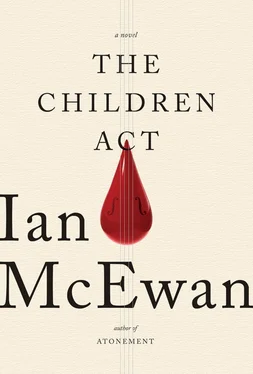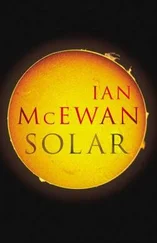“I’ve been learning for four weeks exactly and I can play ten tunes.” His boast too made it impossible to deflect him. He was turning the pages impatiently. Fiona looked over at Marina and shrugged.
“But this one is the hardest yet. Two sharps. D major.”
Fiona was looking at the music upside down. She said, “It might just be B minor.”
He didn’t hear her. He was already sitting up, with the violin tucked under his chin, and without pausing to tune the strings, he began to play. She knew it well, this sad and lovely melody, a traditional Irish air. She had accompanied Mark Berner in Benjamin Britten’s setting of the Yeats poem “Down by the Salley Gardens.” It was one of their encores. Adam played it scratchily, without vibrato, of course, but the pitch of the notes was true even though two or three were wrong. The melancholy tune and the manner in which it was played, so hopeful, so raw, expressed everything she was beginning to understand about the boy. She knew by heart the poet’s words of regret. But I, being young and foolish … Hearing Adam play stirred her, even as it baffled her. To take up the violin or any instrument was an act of hope, it implied a future.
When he finished she and Marina applauded, and from his bed Adam made an awkward bow.
“Stupendous!”
“Fantastic!”
“And only four weeks!”
Fiona, in order to contain the emotion she felt, added a technical point. “Remember that in this key the C is sharp.”
“Oh yes. So many things to think of at once.”
Then she made a proposal that was far removed from anything she would have expected of herself, and which risked undermining her authority. The situation, and the room itself, sealed off from the world, in perpetual dusk, may have encouraged a mood of abandon, but above all, it was Adam’s performance, his look of straining dedication, the scratchy inexpert sounds he made, so expressive of guileless longing, that moved her profoundly and prompted her impulsive suggestion.
“So play it again, and this time I’ll sing along with you.”
Marina got to her feet, frowning, perhaps wondering whether she should intervene.
Adam said, “I didn’t know there were words.”
“Oh yes, two beautiful verses.”
With touching solemnity, he raised the violin to his chin and looked up at her. When he began to play she was pleased to hear herself find the higher notes easily. She had always been secretly proud of her voice, and never had much chance to use it outside the Gray’s Inn choir, back when she was still a member. This time the violinist remembered his C sharp. On the first verse they were tentative, almost apologetic, but on the second, their eyes met and, forgetting all about Marina, who was now standing by the door, looking on amazed, Fiona sang louder and Adam’s clumsy bowing grew bolder, and they swelled into the mournful spirit of the backward-looking lament.
In a field by the river my love and I did stand,
And on my leaning shoulder she laid her snow-white hand.
She bid me take life easy, as the grass grows on the weirs;
But I was young and foolish, and now am full of tears.
As they finished, the lad in the brown jacket was rolling his trolley into the room and the brushed-steel plate-covers made a cheerful tinkling sound. Marina had gone out to the nurses’ station.
Adam said, “‘On my leaning shoulder’ is good, isn’t it? Let’s do it again.”
Fiona shook her head as she took the violin from him and laid it in its case. “‘She bid me take life easy,’” she quoted to him.
“Stay just a tiny bit longer. Please.”
“Adam, I really do have to go now.”
“Then let me have your e-mail.”
“Mrs. Justice Maye, Royal Courts of Justice, the Strand. That’ll find me.”
She rested her hand briefly on his narrow cold wrist, then, not wanting to hear another protest or plea from him, she went toward the door without looking back, and ignored the question he called weakly after her.
“Are you coming back?”
THE RETURN JOURNEY to central London was quicker and during it the two women did not speak. While Marina made a long phone call to her husband and children, Fiona wrote notes toward her judgment. She entered the Courts of Justice by the main entrance and went immediately to her room, where Nigel Pauling was waiting. He confirmed that all the arrangements were in place for the Court of Appeal to sit tomorrow, if necessary at an hour’s notice. Also, tonight the hearing had been moved to a court large enough to accommodate all the press.
When she entered and the court rose it was just after nine fifteen. As the room settled she sensed impatience among the journalists. For the newspapers, this was not a convenient time. At best, if the judge was succinct, the story might make the late editions. Immediately in front of her, the various legal representatives and Marina Greene were arranged as before, within a wider space, but Mr. Henry was alone behind his counsel, without his wife.
As soon as she sat, Fiona began her routine introductory remarks.
“A hospital authority urgently requires the permission of the court to treat against his wishes a teenage boy, A, with conventional procedures they deem medically appropriate, which in this case includes blood transfusions. They’re looking for this relief under a Specific Issue Order. The application, made forty-eight hours ago, was on an ex parte basis. As duty judge, I granted it, subject to their assurances. I have just returned from visiting A in hospital, accompanied by Mrs. Marina Greene for Cafcass. I sat with him for an hour. That he’s extremely ill is plain to see. However, his intellect is in no way impaired and he was able to make his wishes known to me with great clarity. The treating consultant has told this court that by tomorrow A’s situation will have become a matter of life and death, which is why I give judgment so late on a Tuesday evening.”
Fiona named and thanked the various counsel, their solicitors, Marina Greene and the hospital for helping her come to a decision in a difficult case that had to be speedily resolved.
“The parents oppose the application on the basis of their religious faith, which is calmly expressed and profoundly held. Their son also objects and has a good understanding of the religious principles and is possessed of considerable maturity and articulacy for his age.”
She then set out the medical history, the leukemia, the recognized treatment which generally had good outcomes. But two of the drugs conventionally administered caused anemia, which needed to be countered by blood transfusion. She summarized the consultant’s evidence, noting in particular the declining hemoglobin count and the dire prognosis if it was not reversed. She could personally confirm that A’s breathlessness was now apparent.
The opposition to the application rested on three principal arguments. That A was three months short of his eighteenth birthday, was highly intelligent, understood the consequences of his decision and should be treated as being Gillick competent. In other words, as worthy of recognition for his decisions as any adult. That refusing medical treatment was a fundamental human right and a court should therefore be reluctant to intervene. And third, that A’s religious faith was genuine and should be respected.
Fiona addressed these in turn. She thanked counsel for A’s parents for bringing to her attention the relevant Section 8 of the Family Law Reform Act of 1969: the consent of a sixteen-year-old to treatment “shall be as effective as it would be if he were of full age.” She set out the conditions of Gillick competence, quoting Scarman along the way. She recognized a distinction between a competent child under sixteen consenting to treatment, possibly against the wishes of its parents, and a child under eighteen refusing life-saving treatment. From what she had gathered that evening, did she find A to have a complete grasp of the implications of having his and his parents’ wishes granted?
Читать дальше












